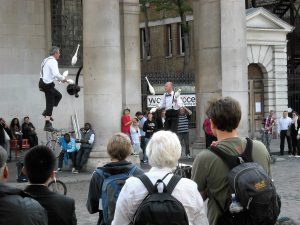 Psalm 18:4-6
Psalm 18:4-6
The cords of death entangled me; the torrents of destruction overwhelmed me. The cords of the grave coiled around me; the snares of death confronted me. In my distress I called to the Lord; I cried to my God for help. From his temple he heard my voice; my cry came before him, into his ears (NIV).
Next, David sang about the desperate situation from which the Lord had rescued him. We don’t know the tune to which these words were sung, but a minor key would have been a good choice. In this broken world there are many times that we will be melancholy and downcast. This is unpleasant. David was not ashamed to write about the dark times of his experience. He wanted his people to face cold, gloomy reality.
This is very unlike some of the songs I learned in Sunday School in my childhood. Here is a one: “I’m in right, out right, up right, down right, happy all the time. I’m in right, out right, up right, down right, happy all the time. Since Jesus Christ came in and cleansed my heart from sin, I’m in right, out right, up right, down right, happy all the time.” I assume that the teachers wanted Sunday School to be a warm, welcoming place. And after World War II, the Korean War, and during the Cold War, they themselves probably wanted to escape from the horrors of life. However, the song did not present an accurate view of life or what the Lord promised his people in their walk with him. The point is not to fill the hearts of children with terror, but it is to say what is accurate.
Accuracy about life and God’s ability to deliver fill this psalm. David started the song on a positive note. Then, in the verses quoted above, he described the reason God’s might was needed to rescue. In the English of the NIV, depressing “D” words pile up to make his point: death… destruction… distress. The word translated grave is the Hebrew Sheol, the invisible realm of the dead, from which only the Lord can deliver. David piled up words to announce that he was totally dependent on God, apart from his mighty power, he was certain to die. Until we understand our desperate need, we will not cry out to the Lord to save. David wanted people to feel how bad his case was. Unless the living God had intervened, he was dead.
In this apparently hopeless situation, David did what people who believe in God do. He prayed. Notice again the personal relationship he claimed with God: I cried to my God for help. Because he knew God, he brought his requests to God. He knew that God heard him. From his temple he heard my voice; my cry came before him, into his ears. God has compassion on us in our trials. He may not answer the way we want or expect, but he does act as we pray. David wrote to give God’s people words and ideas for us when we cry out to the Lord. He wanted them to know that in the bleakest times, God hears and cares and helps his people. Don’t give way to despair. God might well have closed one way for you. But he who will not lead you one way will lead you another, as you trust in him. Trust in the Lord with all your heart, and do not rely on your own understanding; in all your ways know him, and he will make your paths straight (Proverbs 3:5-6 CSB).
Grace and peace, David

 Psalm 18:1-3
Psalm 18:1-3 Psalm 145:1-3
Psalm 145:1-3 Genesis 46:1-7
Genesis 46:1-7 Proverbs 14:26-27
Proverbs 14:26-27 Psalm 104:1
Psalm 104:1 The heavens declare the glory of God; the skies proclaim the work of his hands (Psalm 19:1 NIV).
The heavens declare the glory of God; the skies proclaim the work of his hands (Psalm 19:1 NIV). Luke 9:57-62
Luke 9:57-62 2 Peter 1:20-21
2 Peter 1:20-21 Luke 1:29-33
Luke 1:29-33